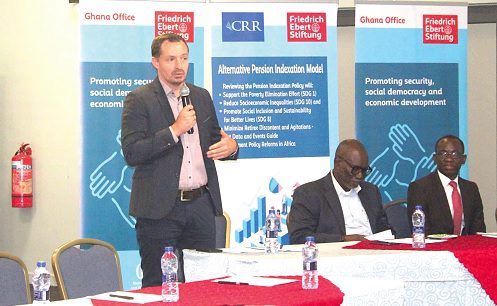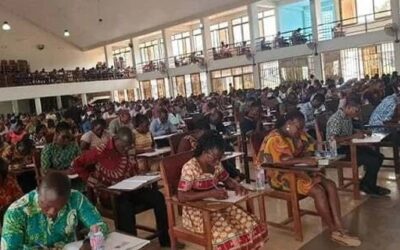Many Ghanaian retirees face low pensions because allowances, not basic salaries, often determine SSNIT benefits, highlighting the need for smarter salary planning.
nanadwumor

-
SSNIT advises employees to prioritize higher basic pay over allowances to boost retirement benefits.
-
Maximum pension after 35 years is 60% of the average three best years’ basic salary, with annual increments.
-
Employees who shift most earnings into allowances risk receiving much lower pensions.
-
Over 257,000 people are on the SSNIT payroll, with pensions ranging from GH¢300 to GH¢201,000.
-
Proper salary structuring and compliance with SSNIT rules are crucial for financial security in retirement.
RECOMMENDED ARTICLES
🚨 Heads up! Your Kidney is calling out to you. Top 10 reasons you may be developing kidney problems. Act now! 🚨
Picture this: Your kidneys, decked out in sunglasses and talking on a tiny kidney-sized cellphone, urgently calling for your attention. 😎📞 But they're not ordering pizza; they're trying to tell you something crucial about your health!...
Why BECE And WASSCE Examination Malpractices Are To Blame For Poor Performances By Prospective Teachers in 2023 GTLE Examinations
According to the Registrar of the Ghana Teacher Licensure Examination (GTLE), Dr. Christian Addai-Poku, out of the 7,728 prospective teachers who sat for the licensure examination in May, 2023, just a handful of 1,277 passed. [Sassy_Social_Share title="Sharing is...
Top 10 Ways to Lose Weight Naturally: Achieve Your Health Goals
Losing weight naturally is a journey that requires patience, consistency, and a commitment to overall well-being. Eat a Balanced Diet Stay Hydrated Increase Physical Activity Practice Portion...
A study by the Africa Centre for Retirement Research (ACRR) has shown that many retired Ghanaians live in severe financial hardship.
Based on a poverty line of two dollars per day, the research discovered that about 60% of retirees—three out of every five—struggle to meet basic living needs.
Presenting the results on October 22 at a stakeholder meeting, ACRR’s Executive Director, Abdallah Mashud, urged authorities to reform the pension system to ensure fairness and better support for retirees.
He proposed a means-based adjustment, suggesting that pension increases should be scaled so that those receiving higher pensions get smaller increments compared to lower-income retirees.
He noted that the suggested approach was designed to reduce the widening income gap among retirees and strengthen the long-term financial stability of the SSNIT pension system.
According to him, the current model—linked to wage and inflation adjustments—worsens inequality by favoring higher earners and lacks safeguards to protect the scheme from rising inflation.
Speaking at the stakeholder session on ACRR’s alternative pension indexation model, held in partnership with Friedrich Ebert Stiftung (FES), Mr. Mashud added that existing poverty support measures under the scheme offer little financial security for low-income pensioners.
The Findings
The study revealed a widening financial gap between low-income and high-income retirees, noting that each time pensions are adjusted under the current model, the disparity grows larger—contradicting the core idea of social security and global best practices.
Mr. Mashud added that 70% of pensioners surveyed considered their benefits insufficient, while about 78% demanded a revision of the indexation policy to better match inflation and offer fairer support for those with lower incomes.
Out of 1,700 participants nationwide, only 3% were neutral about changing the policy, and 1% opposed any modification.
With the majority favoring reform, he stressed that the system must be updated to improve benefits and uphold social security’s mission of protecting vulnerable retirees.
He emphasized that a focused and equitable pension adjustment model is essential—one that aligns with global reforms aimed at boosting income for the poor and fostering shared economic progress.
Means-testing approach
Mr. Mashud explained that ACRR recommended a means-based system where pension adjustments would differ by income level—those with higher pensions would receive smaller increases, while lower-income retirees would get higher increments.
He added that this approach is intended to narrow income disparities among pensioners and strengthen the long-term financial health of the SSNIT pension scheme.
Inequalities
Reacting to the findings, Martin Guettler, Country Representative of FES, noted that Ghana and Germany share similar challenges in their pension systems and expressed hope that both nations could benefit from exchanging ideas and solutions.
Dr. Frank Odoom, Chair of ACRR’s Advisory Board, added that Ghana’s pension structure has evolved over time, and while the current three-tier system is a step in the right direction, it still faces certain difficulties.
He explained that the state-managed first-tier scheme—the basic national social security plan—is designed to guarantee a level of financial stability for all contributors after retirement.
He pointed out, however, that low-income retirees were not fully protected, since annual pension adjustments tended to benefit higher earners more, widening the divide between the two groups.
Background
SSNIT has long advised workers to prioritize higher basic salaries rather than shifting earnings into allowances to avoid taxes and the 13.5% SSNIT contribution.
Under the National Pensions Act, 2008 (Act 766), employees who contribute for 35 years or more are entitled to a maximum pension of 60% of their average three best years’ basic salary, with yearly increases.
For example, someone earning GH¢1,000 as basic pay plus GH¢5,000 in allowances would receive only 60% of GH¢1,000—GH¢600 monthly—after 35 years, instead of GH¢3,000 if the full amount had been included as basic salary.
This is why SSNIT urges workers to ensure allowances are merged with basic pay, so retirement benefits are maximized.
Current data shows over 257,000 people on the SSNIT pension list, with top pensions around GH¢201,000 and many receiving just over GH¢1,000, while the lowest is GH¢300. Some active employees still earn as little as GH¢400 basic monthly.
These figures highlight the need for proper salary structuring and adherence to SSNIT rules. Workers are encouraged to focus on true basic pay, as today’s decisions directly affect comfort and dignity in retirement.
Join Our Telegram Group
Join Our WhatSapp Group
You May Also Like…
🚨 Heads up! Your Kidney is calling out to you. Top 10 reasons you may be developing kidney problems. Act now! 🚨
Picture this: Your kidneys, decked out in sunglasses and talking on a tiny kidney-sized cellphone,...
Why BECE And WASSCE Examination Malpractices Are To Blame For Poor Performances By Prospective Teachers in 2023 GTLE Examinations
According to the Registrar of the Ghana Teacher Licensure Examination (GTLE), Dr. Christian...
Top 10 Ways to Lose Weight Naturally: Achieve Your Health Goals
Losing weight naturally is a journey that requires patience, consistency, and a commitment to...




0 Comments